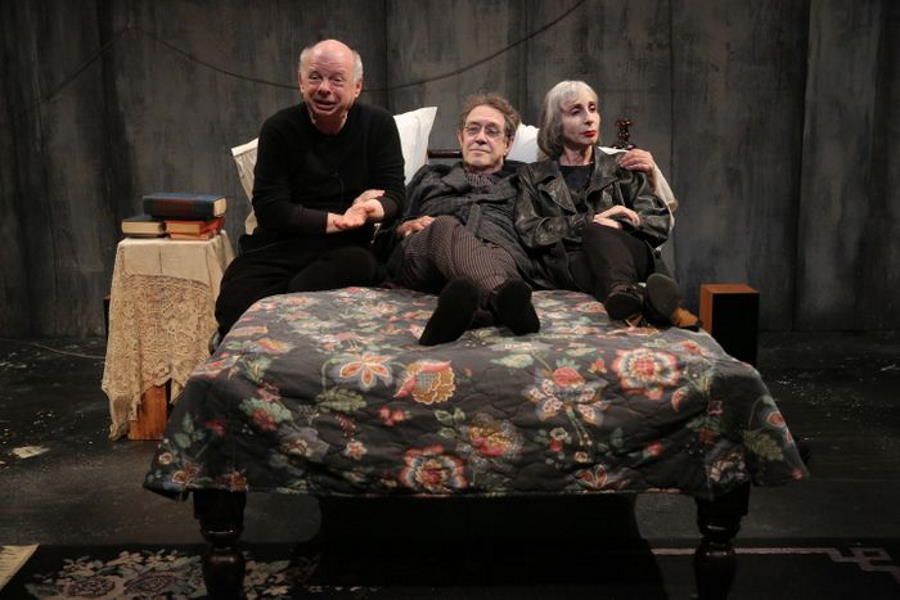In December of 2019, Mac Rogers and I met Wallace Shawn at Harb’s on 22nd and 9th, because, as Wally said, it’s “the only place in my neighborhood I like.” They have a very small menu that includes very large BLTs, so I had the delight of watching Wallace Shawn and Mac Rogers—my two favorite theatre writers—try to eat sandwiches that were simply too large for their mouths. Between bites, I was a guest at one of the most startling and beautiful conversations I’ve been able to witness.
I should back up and say that Mac, along with my wife, Jordana Williams, and I, have been producing theatre in New York for more than 20 years. We have continued for this long because we’ve somehow managed to balance breathless artistic joy with profound professional disappointment. The artists we’ve worked with have been lovely beyond measure, the writing has been transporting, and our audiences and the critics have been incredibly generous with us—but we never quite turned the corner professionally. Mac and Jordana craft these incredible shows, but it has always felt to me, as the lone producer-without-hyphenate, that I was not holding up my end. We could put on a sold-out run with Critic’s Pick reviews at a theatre, but if I ran into the AD who ran the place six months later, they wouldn’t recognize me or remember the names of our plays.
The whole time we’ve been producing theatre, there have been a small group of writers who embody for us the very pinnacle of what can be done with the medium. At the top of that group was Wallace Shawn. His plays are as challenging as they are funny, as obscene as they are tender. They are scathing, passionate condemnations—or celebrations—of the worst in us, using the English language as both scalpel and chainsaw.
In 2013 we collected our pennies and saw The Designated Mourner at the Public. I’d read it, but I was not prepared for my reaction to the performance of it, especially considering the repulsive Republican response to the meager gains of a centrist Democratic administration at the time. I had read Aunt Dan and Lemon, in which liberals are held up as ineffectual and weak, and The Fever, in which liberals were hypocrites unwilling to work for the things they claim to cherish. But now, it was as if Wally were standing in the very same room with us and saying, “When they go—and they will go—we will have nothing left…”
When Wally asked to meet with us in 2019 about possibly recording both The Designated Mourner and Grasses of a Thousand Colors as scripted audio podcasts, it seemed like both a dream and a nightmare coming true. Most shocking was to sit at that table at Harb’s, speaking with a legend who’d had the kind of reception we could only dream about, and hear him begin with, “The truth is, most people hate my plays.” For me, it was bewildering to the point of vertigo. Everyone I knew absolutely worshipped his plays. But he was probably right. Maybe the same people who never noticed our shows went so far as to hate his. When Wally said, “Sean, are you okay?” I realized I had my head in my hands. There was no point in comparing our experiences, so I just eked out, “We…we understand.”
Wally and Mac sitting together—one diminutive and slow to fill a silence, the other over-tall and verbally acrobatic—were incredible to listen to. They couldn’t know how similar they seemed to me. I knew Wally’s work from the outside; I knew he’d been attacked in the U.K. Parliament for “pornographic content” and that his early work was sometimes pilloried in the press. I knew Mac’s work from—well, from being his closest collaborator for 25 years. And I know that people have pulled me aside after Mac’s more disturbing shows and asked, “How does he sleep at night?” I felt like I was sitting with two conjurors, each with their own windows into a series of unsettling fever dreams.
As we prepared to record in January and February 2020, The Designated Mourner obviously resonated with the horrific ascendance of Trumpism. But we were just as passionate about Grasses of a Thousand Colors, a play about a pandemic caused by corporate greed, governmental indifference, and a shifting culture that celebrates our basest instincts. As March turned to April and the COVID-19 pandemic completely upended our lives, a surreal panic overtook me. We had to make these shows.
As an artist—more specifically, as a theatre artist spending your own dimes—it can feel like you are useless. After the 2016 election, my personal hell was watching someone who’d made a fortune in my trade radically affect American culture. Steve Bannon had made a killing as a TV producer while I was running a four-figure nonprofit into the ground. He was leading a right-wing neo-Nazi army to the seat of world power, while I was telling stories to 25 people a night willing to go to a converted garage in Brooklyn for a play.
But now our audio shows were reaching millions of people. Would these same folks listen to Wallace Shawn’s work? Would they understand it? I didn’t know, but it was all we had.

Every artist who worked on these shows before felt the same urgency. I was emailing legends, asking them if they could do these audio plays, asking if I could ship them microphones and laptops and set them up with Zoom and recording software. Every single one of them said, “Anything. Yes. Anything. To do these shows? Anything.”
The sessions were different than the corporate work we’d been doing over the last few years. We love working for big TV and film networks. We love turning scripts into performances and then into new worlds. This was different. Each day we would stop as the city streets would fill with the sound of banging pans and horns, celebrating frontline workers. We would stop recording for the BLM marches that passed our doors. And many times, when an actor would break down, we would quietly wait. The year 2020 was designed to make people cry, and our community—the theatre community—is designed for patience when someone does.
The most alarming moment came when Wally, Mac, and I were on the phone a few months ago, talking about big ideas and our plans for the future, and we had to end our call because our notifications wouldn’t stop. Fascists were attacking the Capitol, people were being killed by right-wing zealots. The Designated Mourner is a show in which people talk about big ideas while fascism slowly takes over in the background, but we had to put off discussions about its release until we knew if the authoritarian coup we were witnessing was going to come off.
It’s hard to believe that we’re a year-and-a-half removed from those initial conversations over BLTs. One reason it doesn’t feel all that removed is because it isn’t. The same horrors Wally wrote about in decades past are even worse now. It’s never been more important for these shows to be out in the world. And yes, it’s true: I am honored and thrilled to call these two brilliant writers friends, but I need to remember that they are soothsayers as well. And that the windows they open to these unsettling fever dreams are also visions of our future.

Sean Williams (he/him) is an actor and executive producer of Gideon Productions and Gideon Media.


